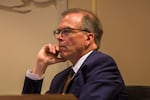A month before the world was forced to isolate, hundreds of people gathered to honor the life of one of Portland City Council's most beloved and veteran political figures.
Nick Fish, who served under four Portland mayors, was praised as an empathetic, consensus-building politician and a long-time affordable housing advocate. He died from stomach cancer while still in office.

Commissioner Nick Fish listens to testimony at City Hall in Portland, Ore., Wednesday, Feb. 13, 2019. Fish died on Jan. 2, 2020, shortly after announcing plans to resign.
Bradley W. Parks / OPB
Now, 18 people have filed to fill the remainder of his term. Since there are so many candidates, a runoff between the top two vote-getters is likely. If no one gets more than 50% of the vote next month, the runoff would happen August 11. The winner of the seat would need to run again for a full term in 2022.
The field of candidates hoping to replace Fish is a weighty one. It includes Tera Hurst, who served as chief of staff to former Mayor Charlie Hales and currently heads Renew Oregon; Metro Councilor Sam Chase; former Multnomah County Commissioner Loretta Smith; Margot Black, a well-known advocate for tenant rights; Julia DeGraw, an environmental and social justice organizer; Cynthia Castro, a policy advisor for Commissioner Amanda Fritz; and Dan Ryan, a former member of the Portland Public Schools School Board and director of the education nonprofit All Hands Raised.
Some of the candidates promise to carry on the consensus-building approach to governing Fish displayed.
Black, a mother of three and math teacher at Lewis and Clark College, said during a Portland City Club debate she would “compromise and collaborate, listen and be willing to be wrong.”
Smith, questioned for her treatment of staff when she served on the county board, said it's important to have a "collegial kind of relationship with everyone on the city council. I know right now everyone is concerned about this crisis and we don't have time for folks to not lead."
Overall, many of the leading contenders agree overall on some of the progressive approaches they say the city of Portland needs to pursue. Take, for example, the city’s unique — some say antiquated — commission form of government.
Currently, each one of the city’s five city council members, including the mayor, manages a portfolio of the city bureaus. Commissioners and the mayor are all elected at large, which has contributed to a lack of racial, gender and geographic diversity.
Many of the candidates agree it’s time to scrap the form of government.
Ryan put it bluntly: “It may be OK for Portland to be weird, we must stop being stupid.”
DeGraw’s agrees: “In over 100 years, the city’s at-large elections have led to a majority of Commissioners elected from the wealthy west side of town, and only 9 women and 3 black people have ever served on Portland City Council — that is not adequate representation, and it needs to change.”
Hurst summed it up this way: “I do not think the commission form of government serves our city well. We put too much power and too little expertise in one office. Trained bureaucrats with specialized skills should be running bureaus; not politicians. Politicians should be representing their constituents and pushing bureaus to do the same – not calling the day-to-day shots of a City department.”
When it comes to the controversial Interstate 5 widening project in Portland's Rose Quarter, several of the candidates said an environmental review committee should happen and it must address equity issues. The project is supposed to help relieve one of the state's most congested stretches of the state's freeway, located on the inner east side of Portland where I-5 merges with 405 and 84.
Cynthia Castro said the project is an opportunity to “restore the Albina neighborhood 70 years after the freeway was built and set a national example” after the original project cut through the predominantly black community and physically divided the Albina community.
And Sam Chase said more work — such as the environmental impact statement — must be done first.
“If we have an alternative process it MUST establish commitments to racial equity and restorative justice, clean air, and true congestion relief. This area will be a community hub in our region for generations to come,” Chase wrote in a response to a survey from OPB.
For more on the candidate's stances, check out the "In Their Words" accompanying story, here.